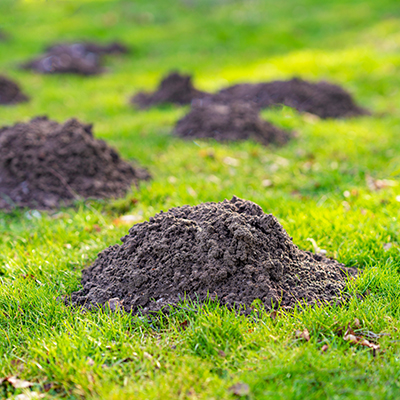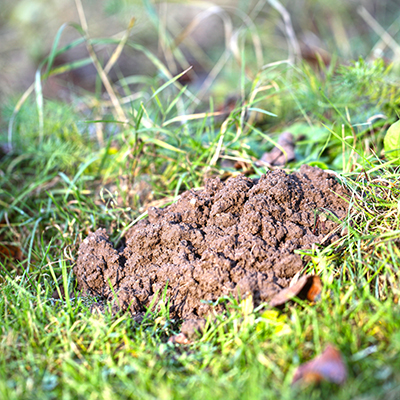

Animals Digging in Your Lawn
The night critters may be cute, but they can be very destructive. Usually, they are just searching for food or they are returning to search a site that has had a plentiful food source. Raccoons will roll-up a lawn while searching for grubs and other larval insects. Skunks make small individual holes when they search for insect larva. Squirrels will dig holes when they burry food. Raccoons and skunks work only at night. Squirrels work only during daylight hours, so if holes appear overnight you know it’s not a squirrel. And then there are gophers and moles…but that’s another story.
The first symptom for grubs in the lawn will be the appearance of brown spots (dead lawn grass) two or three inches in diameter. If the spots increase in size and even join, these are probably grubs enlarging their feeding area. To verify grubs, make a solution of 4 tablespoons of liquid dish detergent (Dawn, Palmolive, etc.) in two gallons of water and sprinkle it over an affected area of one yard square. Sprinkle some on the brown area and some on the adjoining green area. If there are grubs present, they will come to the surface within five minutes. This will not kill them; only bring them up to the surface.
If the dead grass areas do not increase in size and the live grass around its circumference increases in height, the cause was dog urine.
For raccoons and skunks, use Beneficial Nematodes or Bayer Grub Control to get rid of the grubs. The non-chemical solution to prevent damage by raccoons and skunks is to treat the area with Beneficial Nematodes. These microscopic roundworms will hunt down, penetrate, and kill soil-dwelling insect larvae (grubs). They will remain effective for 2 years and are safe for people, pets, earthworms, and the environment. Do not use follow-up insecticides; they will kill the nematodes.
The Beneficial Nematodes should be applied in March or April as the ground begins to warm up. They can be applied until September, but after that only the grub control would be effective.
Chemical insecticides such as granulated Bayer Grub Control (also available as a hose end, liquid spray) will also rid the soil of insect pests and larva. This insecticide should be applied once each year; about April first.
Repellents, such as Coyote Urine, used to discourage animals from digging in lawns are not effective. We have noticed, if the raccoons live in urban areas away from natural predators, they don’t recognize the repellents. Raccoons and skunks may return to your yard and dig, even though you have killed the insects, if they found food there previously. Be patient, they will soon give up.
Squirrels are not easy to get rid of, especially if one of your neighbors is feeding them peanuts. Unfortunately, squirrels are sometimes blamed for damage done by other animals.
A temporary solution to prevent raccoons, skunks, and squirrels from digging in lawns is to cover the perimeter of the area with Ross Garden Netting. The animals evidently are confused and irritated by feeling the plastic net underfoot. The netting will have to be removed when the lawn is mowed, but can be used all summer or until the Beneficial Nematodes or Grub Control ‘take hold’.
Some gardeners have had good luck deterring the night critters by placing a radio in the middle of the lawn tuned to an all night talk program. If the sprinklers come on at night, cover the radio with a big trash bag.
A secondary benefit from the use of Beneficial Nematodes or the Grub Control is that they will prevent many of the brown spots which appear in the lawn during mid to late summer because most of these brown spots are due to insect damage.